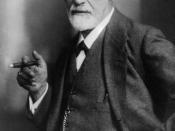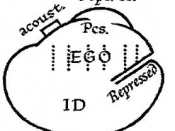A Freudian Outlook on ShakespeareWilliam Shakespeare was an excellent poet and playwright, writing many plays, sonnets and poems, but why does one study Shakespeare hundreds of years after his death? It is because his works never ceases to amaze us; not only is it fascinating, but some of his ideas predate those of other famous writers and philosophers. In Hamlet, for instance, one sees a play with themes and ideas that Sigmund Freud discovered about three hundred years after it was written. Through FreudÃÂs division of mind and the Oedipus complex, one sees how FreudÃÂs psychological concepts are foreshadowed in ShakespeareÃÂs Hamlet hundreds of years earlier.
Freud classifies the mind into three divisions: the id, the ego, and the super-ego. Strickland calls the id the most basic and rudimentary part of the humanÃÂs mind. (Strickland ed. 323). It can be described as attaining immediate gratification without worrying about the consequences.
This is seen in Hamlet when Hamlet feels no guilt after killing Polonius. Instead of feeling sorry and guilty for such a horrible act, he scorns Polonius by saying: ÃÂThou wretched, rash, intruding fool, farewell! / I took thee for thy better. Take thy fortune. / Thou find'st to be too busy is some dangerÃÂ (Shakespeare 3.4 32-35). Another part of the id is the urge or lust for sexual pleasure. This can be seen with these two erotic puns Hamlet makes towards Ophelia: ÃÂLady, shall I lie in your lapÃÂ (3.2 102). Also: ÃÂDo you think I meant country mattersÃÂ (3.2 106). In addition, although no direct quote can relate hamlet to the sexual desire of his mother, it can easily be interpreted as so.
The next part of FreudÃÂs division of the mind is the ego. The ego acts like a mediator between the id and the...


